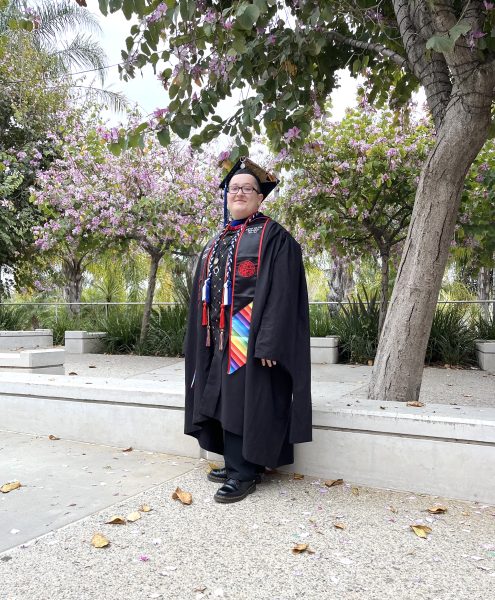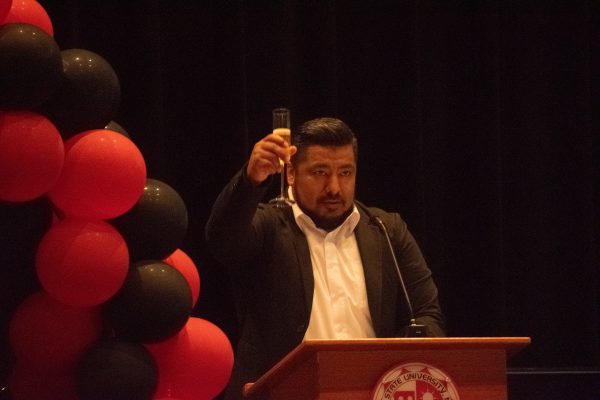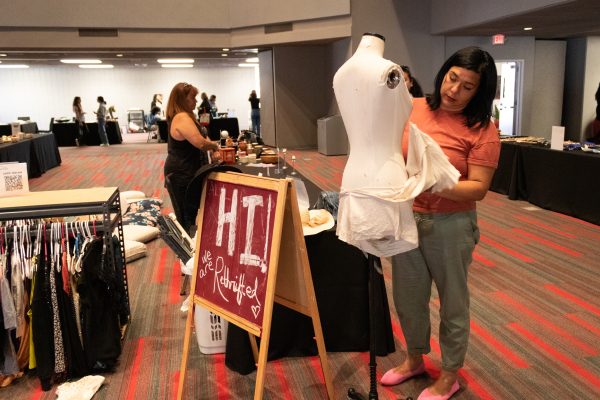Pride Center holds ‘Trans-Gression Punk Show’
A band playing at a concert on Nov. 19, 2022, in Northridge, Calif.
December 12, 2022
The CSUN Pride Center held its “Trans-Gression Punk Show” at the Grand Salon in the University Student Union on Nov. 15, in honor of Transgender Awareness Week.
Purple lights and blaring speakers filled the atmosphere as many attendees headbanged, stomped on the floor, and danced the pogo. All of the artists performed songs related to the transgender experience and the marginalization of their identities. Many songs also leaned into the politics of the punk subculture, which are primarily far left and anti-capitalist.
The Pride Center’s T-Time facilitators, Lou Hartmann and Octavian Martinez, organized the event. Hartmann, who is also the head of trans programs for the Pride Center, explained that the event aimed to support local trans artists and musicians. He wanted to provide a “space of celebration and fun” instead of a mourning one because “trans lives are most valued [regardless if] they’re alive or passed.”
The lineup consisted of Ginchy Gayjacket and the Flushable Wipes, Carla Cabrona and Elias Mx, Josie Wreck, and YGSLRHSTFUT, also known as You Guys Suck. All are punk rock artists with members who fall under the trans and nonbinary umbrella.
Ginchy Gayjacket and the Flushable Wipes were the first to perform. Yanka Ginchy Glowniss, also known as Ginchy Gayjacket, performed lead guitar and vocals, while K.T. Kinetic did bass and backing vocals.
Their song topics ranged from their experiences growing up in Alabama, “blowing up port-a-potties,” to critiques against “Harry Potter” author J.K. Rowling, who received backlash years ago for comments on Twitter regarding biological sex and the use of public restrooms.
Matías Anaya and Estrella Mx, also known by their stage names Carla Cabrona and Elias Mx, appeared next. The topics of their songs included experiences of gender-nonconforming, nonbinary or post-gender people.
One notable song critiqued the police system in America. Anaya spoke against the police regarding her feelings on what she saw as the treatment of trans people in the middle of the performance, and gathered the crowd to stomp on the floor as a protest.
“They are murderers roaming our streets terrorizing the people in the name of the police,” Anaya claimed, while seemingly calling for the end of policing and the death of members of the law enforcement community. “None of us will breathe until they are abolished, [and] not only abolished but dead.”
Josie Wreck, Franz Murder and Christopher Gregory were the next to perform. Wreck performed vocals and lead guitar, Murder played bass and Gregory did the drums.
They performed original songs such as “Sweet and Sour,” while also covering Q Lazzarus’s “Goodbye Horses,” which is notable for its use in the 1991 horror film “The Silence of the Lambs.”
Before performing a song, Wreck gave a speech about unionization and spoke against capitalism. As Wreck began strumming her guitar, she told the audience, “You are the means of production. You perpetually produce your own demise. Seize yourself from the brainless labor!”
The final band was You Guys Suck, or YGSLRHSTFUT. Their full name translates to “You Guys Suck Like Really Hard. Shut The F— Up. Thanks.” Performing members included Chella Coleman on lead vocals, Maya Faith as bassist and Anaya on drums.
Coleman sang of her experiences as a Black, disabled, overweight, trans woman. She sang to the microphone, “Black, fat, trans,” in the band’s opening song as attendants bobbed their heads.
Mx, who performed with Anaya, commented to The Sundial and explained how the punk scene and trans identities are connected, along with the inherent “transness” within this alternative genre.
“‘Transness’ is everything. It is in our everyday lives. There’s no f— binaries with us,” Mx said. “I think that’s what punk is and should be: going against all binaries [and] all expectations about the genre. ‘Transness’ is inherently punk as we don’t abide by anything.”
Hartmann gave further comments about this near the end of the event. He stressed that “transness” relates to punk culture through the values of fighting to live, especially when trans lives are at stake.
“Existence and resilience are canonical of both subcultures and communities,” said Hartmann. “The will to live and the persistence to live is the most punk rock thing you could do.”










